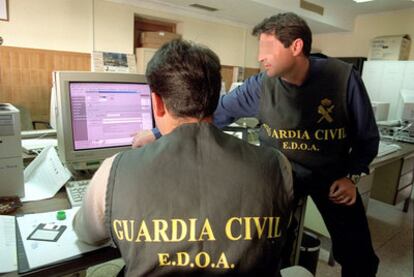Could Twitter users reporting child porn be guilty of a crime?
Police and Civil Guard offer differing opinions on the way online offenses should be flagged up
Internet social networks are changing the way citizens communicate with law enforcement agencies. To alert the authorities about a crime, in particular one detected online, people are increasingly making use of micro-blogging site Twitter, sending a message that often includes a link to a website that may be in breach of the law.
One of the crimes that "netizens" are most sensitive to is child pornography. But the National Police, through its official Twitter account, issued a warning in late December: "Sharing pedophile links or profiles, even if it is just to report them, could constitute a CRIME. Instead send an email to denuncias.pornografia.infantil@policia.es. The BIT (Technological Investigation Brigade) manages all mails received privately and no crime is being committed that way. Thanks for your cooperation!"
The very next day, the Civil Guard's own specialized online crime unit published a note on its website. The statement essentially sought to add nuance to the National Police's message without actually contradicting their colleagues. It started out by stressing that "it is the state attorney's office and the judicial authorities who must decide whether it is a crime."
"As for being in possession of pornographic material there are no doubts: one either is or is not in possession of it. The problem lies in what is meant by direct distribution. Is publicly reporting a pedophile profile on Twitter considered distribution? It seems difficult to hold the user reporting this content responsible, since there is no direct distribution (the holder of this material is being communicated, not the material itself); furthermore, there is no intent to disseminate pornographic material (absence of malice), rather on the contrary. To us it is clear: this is not a case of distribution, but of cooperating with the Civil Guard to eradicate an evil of society. We can therefore do little more than thank you for your effort, your help and your dedication."
Yet even the Civil Guard underscores that there are better channels through which to report online child pornography, such as via email or the agency's own website.
Carlos, head of the social-networking department at the National Police, says the same. "We ask for greater privacy because they could unwittingly be disseminating the very thing they are trying to eradicate. Our tweet was a warning: 'Send it to us, but over e-mail.' All links are investigated, but please do not share them because technically that could be considered distribution and that is a crime. Besides, despite the good intentions, ultimately you are giving that profile greater exposure," he says.
The chief commissioner of BIT, Manuel Vázquez, adds that this is a complex issue and that eventual malice could be construed. "There are some court rulings in connection with that; besides, it could endanger the person reporting the crime," he says. Yet Vázquez and his colleague in the social network unit stress that citizen cooperation is essential, and they encourage people to keep doing so, only through private channels.
"There is a lot of social awareness when it comes to child pornography. A few messages asking for cooperation were forwarded more than 5,000 times, including by people such as (Prime Minister) Mariano Rajoy," explains Carlos.
Both the National Police and the Civil Guard agree, however, that citizen cooperation must remain strong. Every suspicious link sent their way is investigated, even if for the most part these are hosted on foreign websites, in which case Spanish agents get in touch with their colleagues in the corresponding country. If the site has a Spanish domain name, the investigation proceeds and could end in a successful raid, says Vázquez.
It is less frequent for child pornography to be found on social networks themselves. "This is very unusual, but if we are sent information, we also investigate it and get in touch with the social network if it falls outside our borders, which is the most common occurrence," says the chief commissioner.
Yet what people report the most are swindles propagated through the internet. "And increasingly, also online impersonation, which takes up a lot of time because it is bureaucratically complex, even if technologically it would be very easy to uncover the offender," says Vázquez.

Tu suscripción se está usando en otro dispositivo
¿Quieres añadir otro usuario a tu suscripción?
Si continúas leyendo en este dispositivo, no se podrá leer en el otro.
FlechaTu suscripción se está usando en otro dispositivo y solo puedes acceder a EL PAÍS desde un dispositivo a la vez.
Si quieres compartir tu cuenta, cambia tu suscripción a la modalidad Premium, así podrás añadir otro usuario. Cada uno accederá con su propia cuenta de email, lo que os permitirá personalizar vuestra experiencia en EL PAÍS.
¿Tienes una suscripción de empresa? Accede aquí para contratar más cuentas.
En el caso de no saber quién está usando tu cuenta, te recomendamos cambiar tu contraseña aquí.
Si decides continuar compartiendo tu cuenta, este mensaje se mostrará en tu dispositivo y en el de la otra persona que está usando tu cuenta de forma indefinida, afectando a tu experiencia de lectura. Puedes consultar aquí los términos y condiciones de la suscripción digital.








































